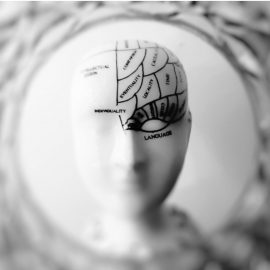
Could your daily habits be sabotaging your health and happiness? How can you break free from destructive patterns?
In Brain Wash, Dr. David Perlmutter and physician Austin Perlmutter argue that our modern lifestyles—filled with technological distractions, processed foods, and chronic stress—are impairing our brain function and decision-making abilities. They suggest simple lifestyle changes to destroy the cycle of damaging choices.
Read more in our book overview of Brain Wash.
Overview of Brain Wash by David and Austin Perlmutter
In Brain Wash, David and Austin Perlmutter argue that our modern lifestyles are full of chronic stress, technological distractions, and unhealthy foods that impair our brain function and ability to make good decisions. This causes us to make unhealthy choices that damage our health and relationships while putting us on the path to chronic disease, anxiety, depression, and loneliness. However, the Perlmutters write that you can make simple lifestyle adjustments to reclaim your health and happiness in the modern world.
David Perlmutter is a neurologist and Fellow of the American College of Nutrition. He’s an associate professor at the University of Miami Miller School of Medicine and has received various awards for his work, including the Linus Pauling Award and the Humanitarian Award from the American College of Nutrition. He’s the best-selling author of several books, including Grain Brain and Brain Maker. His son Austin Perlmutter is an internal medicine physician who graduated from the University of Miami Medical School and completed his residency at Oregon Health & Science University. He is also the CEO of Lichen Air and the managing director of Big Bold Health.
The Problem: Modern Life Makes Us Unhealthy and Unhappy
David and Austin Perlmutter argue that modern life is full of conveniences that seem to make life better but actually damage your physical and mental health. For example, instead of spending a lot of time in the kitchen to prepare a meal, you can order fast food delivery; instead of being bored, you can binge-watch TV shows late into the night. However, such habits can lead to poor nutrition, lack of sleep, and less physical activity.
The Science: Why We Can’t Stop Our Bad Habits
If our current lifestyle is making us unhappy and unhealthy, then why do we keep living this way? The answer lies in how this lifestyle affects our brains. The Perlmutters explain that two regions in your brain work together to influence how you make decisions:
- The amygdala controls your emotional and impulsive responses. It works automatically, meaning you don’t think about these reactions—for instance, when someone scares you, you might instantly jump without consciously deciding to do so.
- The prefrontal cortex gives you the ability to reason, plan, and regulate your emotions. This region allows you to think about and analyze different choices instead of making knee-jerk reactions.
The Perlmutters write that in a healthy brain, these parts work together, with the prefrontal cortex keeping your emotional responses in check. However, modern habits tend to weaken your prefrontal cortex and put the reactive, emotional part of your brain in control. This makes you more likely to choose things that feel good in the moment (like scrolling through social media or eating junk food) instead of things that are good for you in the long run (like exercise or healthy eating).
The Perlmutters explain two main ways modern lifestyle habits keep your amygdala in control, causing you to make poor decisions: by tricking your reward system and keeping you in a state of constant stress.
1. Modern Life Tricks Your Brain’s Reward System
The Perlmutters argue that modern habits trick your brain’s reward system. This system evolved to help our species survive: When you do important things for survival, like finding food, your brain releases a chemical called dopamine that encourages you to repeat that behavior.
But today, your brain releases dopamine for things that aren’t necessary for survival. When you get likes on social media, buy new shoes, or eat sugary snacks, you get the same dopamine rush as if you’d done something that let you live another day. The problem is that it’s easy to overdo these activities. When you repeatedly seek quick pleasures, your brain becomes less sensitive to them, so you need more and more to feel good, leading to addictive behaviors. As a result, you keep up your bad habits even though you know they’re not good for you.
2. Stress Causes You to Make Worse Decisions
The Perlmutters write that modern life is full of stress triggers, such as work, negative news coverage, and arguments on social media. When you feel stressed, your brain releases hormones that trigger your fight-or-flight response and activate your amygdala, overriding rational decision-making. With your amygdala in control, you tend to pursue activities that bring you short-term relief (or pleasure) and help you avoid pain at the expense of your long-term well-being.
Stress also increases dopamine in your brain. While this might sound positive, experiencing the release of dopamine too frequently can harm your brain’s natural reward system (as we discussed earlier), making you need increasingly more stimulation to feel pleasure. As a result, you seek more stimulation through activities like eating sugary foods or scrolling social media. The more you give in to these quick fixes, the harder it becomes to choose healthier options like going for a walk, meeting friends, or cooking a healthy meal. It’s a cycle that makes your bad habits stronger and your good habits weaker.
The Solution: Habits for a Healthier Brain
We’ve discussed how our modern lifestyle can send us down a spiral of poor choices that damage our health and happiness. Now, let’s talk about how we can correct our course and improve our brain health. The Perlmutters write that you can establish healthier habits that reduce activity in your amygdala and restore proper function to your prefrontal cortex. They suggest six lifestyle changes: Limit technology use, improve your diet, get exercise, reconnect with nature, improve your sleep, and practice mindful meditation.
Tip #1: Limit Technology Use
The first healthy habit the Perlmutters recommend is to reduce technology use. They argue that tech companies have deliberately created addictive features to trick your brain into using technology longer than you plan to. For example, social media feeds encourage endless scrolling, while autoplay features keep you watching video after video.
The Perlmutters explain that too much screen time damages your mental health and relationships. Social media, for one, creates a false sense of connection, with research showing that heavy social media users feel three times more socially isolated than more casual users. This is because communicating with online friends isn’t the same as interacting with people in person. Meeting face-to-face lets you pick up on body language, see each other’s emotions, and build trust through physical closeness.
To spend less time on your devices and form better relationships, the Perlmutters recommend you set rules for technology use and strengthen your empathy.
Set Healthy Rules for Technology Use
According to the Perlmutters, due to the addictive nature of technology, you must intentionally set limits to control your technology use instead of letting it control you. To do this, consider three rules:
1. Set specific hours for using devices with clear start and stop times. For example, you might decide on a window of 7 p.m. to 8:30 p.m. for personal social media use. To avoid distractions, turn off phone notifications and create dedicated time blocks for messages and emails.
2. Use technology with purpose. Before picking up your phone, tablet, or laptop, ask yourself, “Why am I using this device right now?” Asking this question prevents mindless scrolling and time-wasting.
3. Keep only helpful apps. Notice how different apps and social media affect your mood and productivity. Then, keep apps that help you work, learn, or connect meaningfully with others, and remove those that waste your time or make you feel anxious or unhappy.
Strengthen Your Empathy
In addition to controlling your technology use, the Perlmutters recommend that you develop empathy—the ability to understand and share other people’s feelings and experiences. They argue that technology promotes self-centered behaviors that make us less empathetic. For instance, social media encourages us to constantly promote ourselves while chasing likes and comments.
The Perlmutters explain that strengthening your empathy has many benefits. It can help you form deeper, more fulfilling connections with people. It can also improve your health because empathy makes your brain release feel-good chemicals that boost your mental and physical health. Practicing empathic behaviors also activates reward pathways in your brain, strengthens your immune system, and makes you more creative and better at emotional control.
According to the Perlmutters, you can build your empathy by trying to experience life from another person’s point of view. Volunteering and performing acts of kindness can also activate brain regions associated with empathy. At the same time, create space for your empathy to grow by limiting activities that promote narcissism, like excessive social media use and comparing yourself to others.
Tip #2: Improve Your Diet
The second healthy habit the Perlmutters recommend is to eat a healthy diet of natural foods and avoid processed foods. They explain that the modern food industry packs their products with sugar, salt, and unhealthy fats that make us crave more while providing little nutritional value. Processed foods lead to weight gain, diabetes, heart disease, and other chronic conditions. The authors point out that our bodies still operate best with the diverse, nutrient-rich diet our ancestors ate, with more healthy fats and fiber and fewer refined carbohydrates.
The Perlmutters explain that many of us eat a lot of processed foods because they’re designed to be addictive. Specifically, these foods are addictive because:
1. Marketing tactics create emotional connections. Food companies create positive associations with their processed products through advertising, cartoon characters, and celebrity endorsements that target children from a young age. When children grow up seeing these ads and eating these foods, they can develop strong preferences for them that extend into adulthood.
2. Processed foods activate your brain’s reward pathways. The more your reward circuits are activated, the stronger the connections become, making it increasingly difficult to resist unhealthy foods.
3. Processed foods impair decision-making. When you eat foods high in sugar and refined carbs, your body stores more belly fat. Excess fat creates inflammation in your body that weakens your prefrontal cortex, causing you to eat more impulsively. This leads to a destructive pattern where bodily inflammation from poor food choices impairs your decision-making, which then leads to even more poor food choices.
Foods to Eat and Avoid
To break the habit of unhealthy eating, the Perlmutters recommend transitioning to a diet that reduces inflammation and supports better brain function. This means eating whole, nutrient-dense foods while avoiding processed foods and refined carbohydrates. Eat more locally sourced foods and prepare more meals at home rather than relying on processed options.
For protein sources, the Perlmutters suggest choosing wild-caught fish, grass-fed meat, and pastured eggs from free-range chickens. You can also include modest amounts of gluten-free, unrefined grains or seeds like wild rice, quinoa, buckwheat, and millet. Healthy fats should come from sources like extra virgin olive oil, avocado oil, and nuts.
Additionally, the Perlmutters encourage you to support your gut bacteria by eating probiotic foods (like kimchi and yogurt) and prebiotic foods (like dandelion greens, onions, garlic, and leeks).
Tip #3: Get Regular Exercise
Another habit the Perlmutters suggest for improving brain health is to exercise regularly, aiming for at least 20 minutes of aerobic activity five days per week. They explain that exercise changes how your brain works, making it function better.
According to the Perlmutters, exercise improves your brain health in two ways:
First, when you exercise regularly, your brain gets better at making decisions and controlling emotions. This happens because exercise increases blood flow to the prefrontal cortex, which supports the growth of neural connections and improves cognitive function.
Second, exercise reduces inflammation, improves insulin resistance, and helps regulate cortisol levels when done in moderation. The Perlmutters explain that these combined effects allow the prefrontal cortex to better moderate emotional responses while boosting your mood at the same time. As a result, you can find it easier to make smarter choices about everything from what to eat to how to spend your time.
Tips for Exercising
According to the Perlmutters, any movement is better than none when it comes to protecting your brain health and ability to make good decisions. The key is making physical activity a consistent priority, even if you begin with just a few minutes per day. Here are some tips for doing so:
1. Make exercise social and scheduled. Partner with a friend for workouts, join group classes, or schedule regular walking dates. Working out with others increases accountability and makes exercise more enjoyable. The added social connection provides extra motivation while giving you the dual benefits of movement and meaningful interaction.
2. Set yourself up for success. Block specific workout times in your calendar and treat them as important appointments. Making exercise a non-negotiable part of your schedule helps build the habit. The Perlmutters also recommend you prepare workout clothes the night before, especially for morning exercise, so it takes less effort for you to get going.
3. Create a balanced routine. Include a mix of cardio (like walking, swimming, or cycling), strength training, and stretching. Start with small, manageable amounts of activities that you enjoy and gradually increase duration and intensity. Remember that even small amounts of movement, like standing up for two minutes every hour, provide benefits.
Tip #4: Reconnect With Nature
The fourth healthy habit the Perlmutters recommend is to spend more time in nature. They explain that modern life keeps most people indoors and disconnected from the natural world.
Research shows that getting out in nature benefits both your physical and mental health:
1. Physical health: When you spend time in natural settings, your stress hormones decrease, and your immune function improves. Being out in nature also lowers inflammation in your body and helps activate your parasympathetic nervous system, which promotes relaxation and healing. These biological changes also strengthen your prefrontal cortex while calming your amygdala, helping you think clearly and better control your impulses.
2. Mental health: Nature can help restore your depleted attention and let your brain recover from the constant stimulation of modern life. Spending time in nature reduces symptoms of depression and anxiety while increasing your happiness, life satisfaction, and feelings of connection to others. The Perlmutters point out that even brief exposure to natural environments can boost your mood, cognitive function, and creativity.
The Perlmutters explain that nature’s benefits come through multiple pathways. Plants and trees contain compounds called phytoncides that boost immune function and promote relaxation. Being exposed to sunlight also helps your body produce vitamin D, which is necessary for brain health and serotonin production. Also, the visual experience of natural beauty and awe makes people more generous, trusting, and empathetic toward others. Even the beneficial bacteria we encounter in natural settings may help support our gut microbiome.
Tips for Going Outside
To spend more time in nature, the Perlmutters suggest you start with simple daily actions like opening windows to let in sunlight or keeping plants in your office or workspace. You can even consider using essential oils that contain phytoncides. However, the Perlmutters recommend spending at least 30 minutes per week in actual nature settings by walking in parks or hiking in the mountains. For more nature exposure, you can go on nature-focused vacations like ecotours. The key is to treat being in nature as a regular, intentional practice rather than an occasional thing you do by accident.
Tip #5: Improve Your Sleep
According to the Perlmutters, another way to improve your brain health is to get adequate sleep. Sleep deprivation creates serious health problems because sleep affects virtually every system in your body, especially your brain. They note that about one-third of American adults get less than the recommended seven hours of sleep per night.
The Perlmutters explain that poor sleep harms your brain in two ways:
1. Bad decision-making: Sleep deprivation increases activity in the emotional, reactive part of your brain while decreasing activity in your prefrontal cortex. When you don’t get enough sleep, you become more reactive to stress, more likely to feel anxious or depressed, and less able to control your impulses. Poor sleep also triggers inflammation in your body and disrupts hormones that regulate hunger and mood. This makes you more likely to make poor choices when it comes to food and other behaviors.
2. Brain waste: Sleep deprivation prevents your brain from cleaning out harmful waste products that build up during the day. Your brain has a special cleaning mechanism called the glymphatic system that removes waste products. This process only happens during sleep, and when it’s disrupted, toxins can accumulate and damage your brain cells. The buildup of waste materials can eventually lead to conditions like Alzheimer’s disease and depression. The Perlmutters add that this cleanup process becomes less efficient as you age, making good sleep habits even more important for older adults.
Tips for Getting Better Sleep
The Perlmutters recommend several strategies to improve the duration and quality of your sleep:
1. Manage your light exposure. Get bright natural sunlight in the morning to reset your body’s clock, but minimize your exposure to blue light in the evening hours before bed. Blue light is a specific wavelength of light from digital screens that tricks your brain into being alert and blocks your body’s production of melatonin—the hormone that helps you fall asleep. Wear blue-light blocking glasses if you must use devices at night, or enable night mode settings that reduce blue light emission. When you go to bed, keep your bedroom dark, as even small amounts of light can suppress melatonin production, disrupting your sleep quality.
2. Maintain consistent sleep patterns. Make it a goal to get at least seven hours of sleep each night, since this amount is necessary for proper brain function and health. Set regular sleep and wake times to help regulate your circadian rhythm—your body’s natural cycle of sleep and wakefulness.
3. Avoid sleep medications when possible. Sleeping pills don’t produce natural, restorative sleep and may have harmful side effects, including increased risks of cancer, depression, and dementia. Instead of relying on medications, focus on developing healthy sleep habits and addressing any underlying sleep disorders with help from medical professionals.
Tip #6: Practice Mindfulness
Lastly, the Perlmutters recommend that you practice mindfulness—a type of meditation where you focus on becoming fully present in the moment. They argue that being surrounded by constant stimulation means you must reclaim control over your distracted mind by actively choosing to make time for quiet reflection.
Mindful meditation physically changes your brain by preserving brain thickness as you age. The Perlmutters explain that people with thicker brain tissue typically have better cognitive function and memory than people with thinner brain tissue. Meditation also strengthens your prefrontal cortex while reducing activity in your amygdala, allowing you to control your emotions better and make smarter decisions throughout the day.
Tips for Mindful Meditation
To practice mindful meditation, the Perlmutters suggest you begin with basic deep breathing exercises: Find a comfortable position to sit. Close your eyes, let your body relax completely, and then take a deep breath in through your nose. After taking in as much air as possible, release the breath slowly, taking about 20 seconds to let it all out. Repeat this process five times.
In addition to breathing exercises, you can also use meditation apps, attend classes, or listen to guided meditations. Regardless of how you practice mindfulness, make it a habit. The Perlmutters recommend practicing twice daily for at least 12 minutes. Consistency, the authors argue, helps rewire the brain and create lasting benefits for your mental well-being and cognitive function.






